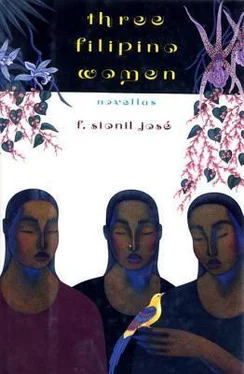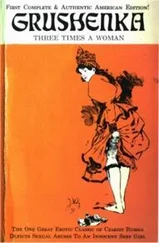Francisco Jose - Three Filipino Women
Здесь есть возможность читать онлайн «Francisco Jose - Three Filipino Women» весь текст электронной книги совершенно бесплатно (целиком полную версию без сокращений). В некоторых случаях можно слушать аудио, скачать через торрент в формате fb2 и присутствует краткое содержание. Год выпуска: 2013, ISBN: 2013, Издательство: Random House Publishing Group, Жанр: Современная проза, на английском языке. Описание произведения, (предисловие) а так же отзывы посетителей доступны на портале библиотеки ЛибКат.
- Название:Three Filipino Women
- Автор:
- Издательство:Random House Publishing Group
- Жанр:
- Год:2013
- ISBN:978-0-307-83028-9
- Рейтинг книги:4 / 5. Голосов: 1
-
Избранное:Добавить в избранное
- Отзывы:
-
Ваша оценка:
- 80
- 1
- 2
- 3
- 4
- 5
Three Filipino Women: краткое содержание, описание и аннотация
Предлагаем к чтению аннотацию, описание, краткое содержание или предисловие (зависит от того, что написал сам автор книги «Three Filipino Women»). Если вы не нашли необходимую информацию о книге — напишите в комментариях, мы постараемся отыскать её.
and
-examine the Philippine experience through the lives of three female characters, a prostitute, a student activist, and a politician.
Three Filipino Women — читать онлайн бесплатно полную книгу (весь текст) целиком
Ниже представлен текст книги, разбитый по страницам. Система сохранения места последней прочитанной страницы, позволяет с удобством читать онлайн бесплатно книгу «Three Filipino Women», без необходимости каждый раз заново искать на чём Вы остановились. Поставьте закладку, и сможете в любой момент перейти на страницу, на которой закончили чтение.
Интервал:
Закладка:
She listened patiently nonetheless to how I was grappling with such weighty subjects as history, progress, and alienation. Thinking back, had Malu been plain, I would not have been interested in her or what she was doing. Faith healing was old news to me, although I wasn’t one to go around writing about spirits.
“It is not that he lacks empathy, because he is good,” she said, still irritated by Professor Galvez’s remarks which, she said, were patronizing. “He is less a Filipino — like all the rest who have gone to the United States and brought back all those inappropriate ideas about research and methodology. Look, all over the country, in spite of our science and our Christianity, a belief in the world of the spirit persists. This world is open to everyone who wants to enter it. Nothing exotic or mysterious. All of us have experienced an inkling, a premonition. Extrasensory perception they call it now. The early Christians were mystics. And Saint Theresa of Avila levitated. The Bible is full of miracles — and why not? Is mysticism Christian when even Christians hardly believe in it anymore? Those who flock to Baclaran or Quiapo praying to those images for favors, that’s not mysticism. It is just simple human need, a natural reaching out to the supernatural …”
I liked the way she explained it. I knew how right she was. In my senior year in high school, I was in the library one afternoon when I distinctly heard Father’s voice. I turned, expecting to see him. But there was no one. As a matter of fact, I was alone except for the clerks at the far end.
I was very disturbed and since it was already late in the day and I had no more classes, I decided to go home instead of playing basketball. Only the maids were in; Mother had rushed to the hospital. Father had had a heart attack and had died at about the same time I heard his voice.
“That is not unusual,” Malu said. “It has been documented. The air is charged with energy, the spirits of people, and sometimes, in cases of great urgency, contact is made.”
The semester was about over; it was a faultless October morning and the sun shone brilliant on the campus, washing the grass and the cream-colored buildings with dazzling light. She did not want to linger in the cafeteria so we crossed the street to the library and beyond it to this huge acacia tree — perhaps the biggest in the entire campus. She liked its cool shade and we were to meet again and again beneath it.
I was flattered that she had read my article listing the economic imperatives of nationalism. She said it was well argued, but then she added that it lacked social purpose. What was nationalism for ? What did it mean to the lower classes, to those who worked the land?
So her interests were also in the here and now. Aside from her involvement with ESP and spirits, she turned out to be a political activist.
We had barely seated ourselves on a protruding root of the tree when she asked if I had joined any of the student demonstrations that were sweeping the city. I had not bothered with them. With a touch of melancholy, she said, “I think you’re a dilettante … engrossed with the veneer and not with the pith.”
I reminded her about what a Frenchman once said: if one is not a communist when one is eighteen, he has no heart; but if he is still a communist when he is forty, he has no head. She retorted that I was neither eighteen nor forty — so what did that make me? And then she railed against the inequities that surrounded us, this girl who lived in an exclusive Makati village, who went to an expensive school. She was going to teach me, she said with some levity, what social awareness was.
Malu was majoring in clinical psychology and was, I am sure, never short of subjects. I suppose that she considered me one, given the manner she asked questions. Often she would be quiet as if my answers were being studied and fitted into her equations. She had a tendency to be patronizing like Professor Galvez. She called me “Teng-ga,” meaning lead, which could have easily been “Tanga,” meaning stupid. I was ponderous, capable of thought, but when all was said, the profundity was without value. I was not concerned with the kind of justice that could only be brought about by a mass movement.
At first, I resented the nickname. I decided to give her one in kind.
“I know myself,” I said. “And the man who knows himself is not only secure but wise.”
“But there are things you don’t know about yourself,” she insisted. “And knowing oneself is not being profound. It is being conceited.”
“And you are not?”
“I don’t think I am the center of the universe.”
“I suppose you consider yourself some sort of precious metal then. Like gold.”
She shook her head. “I am not expensive.”
“But you are,” I said. “With your ideas, who is the man who can afford to love you? Imagine what you will do to his psyche, if not his wallet.”
As if on impulse, she stretched out her hand and held mine.
“And you think you’re heavy, too,” I said.
I remembered my parents’ wedding rings — they were heavy and they looked plain, like silver, or even lead, but they were expensive. “Platinum. That’s what you think you are. I will call you Plat.”
“Male revenge!” she exclaimed. “And I am thin, my breasts are no bigger than kalamansi !”
Her candor touched me. “But their smallness cannot diminish your beauty, Plat. And I would like to make them grow.”
“Into pomelos.” She laughed.
I wanted to take her home the next afternoon so that I could meet her parents, but she demurred. She guessed what I had in mind. “You are so square,” she said, crinkling her nose as if some bad odor assailed her. “You would like to pay court in the traditional way and ask Father for my hand. You should work in our house then, chop firewood, draw water from the well. After all these sacrifices, are you sure you will have a virgin?” She was putting it lightly, but then she came close and breathed into my face. “But I like the way you are doing it.”
She would not give me her address. This I found out soon enough from the registrar’s office where I had a friend. I went there on a Sunday morning and since her house was in Dasmariñas Village, I was not surprised that it was grand. Unlike most of the houses in this expensive Makati area, it was done in the old colonial style — red-tile roof, thick adobe walls, intricate ironwork on the sash windows and balustrades, and a heavy gate of solid molave with iron braces and filigrees. I also realized why she did not want me to visit her — this girl who always rode in buses and jeepneys, who dressed in T-shirt and faded jeans and formless katsa —a fabric similar to cheesecloth — blouses; she was trying to live down the fact that she was rich.
“But in the beginning we were not,” she explained.
My visit had surprised her, but she had asked me in. We proceeded to the patio that overlooked a wide, well-groomed garden, and she served me coffee and the chocolate cake her mother had baked.
“It was all my father’s doing. He is a good businessman. He had this land in Bataan which later became very expensive property. He is a genius in real estate — no one can steal him blind …”
It was meant to be a pun of sorts. Her father was tortured by the Japanese during the war and had lost his sight. He had given Malu as a child a sense of inferiority; she was particularly annoyed when her classmates called him “Antiojos” because of the dark glasses he always wore, even on that evening when she graduated (as valedictorian) in grade school. She went with him on trips, describing places and people, reading the papers to him. She had become adept at description and at intuition by being his perceptive eyes.
Читать дальшеИнтервал:
Закладка:
Похожие книги на «Three Filipino Women»
Представляем Вашему вниманию похожие книги на «Three Filipino Women» списком для выбора. Мы отобрали схожую по названию и смыслу литературу в надежде предоставить читателям больше вариантов отыскать новые, интересные, ещё непрочитанные произведения.
Обсуждение, отзывы о книге «Three Filipino Women» и просто собственные мнения читателей. Оставьте ваши комментарии, напишите, что Вы думаете о произведении, его смысле или главных героях. Укажите что конкретно понравилось, а что нет, и почему Вы так считаете.












